I tested 22 writing tools—yeah, almost all of them—so you don’t have to.
Let's create profiles, look inside, and see what I see. What works, what’s clunky, what’s beautiful, and what just doesn’t cut it if you’re someone like me—an author building massive worlds who needs
From Obsidian to Novelcrafter to tools you’ve probably never even heard of, we’re walking through the pros, cons, prices, and quirks. I don’t pretend to be neutral. If something’s awkward, too busy, or just not designed for the way real writers work, I’ll tell you.
We can all make Google Docs or Microsoft Word work. But there are tools especially built for fiction authors.
How many of these tools hold up to our needs for multiple novels and massive worldbuilding?
Let’s find out.
When I’m looking for software to write a novel, it’s not just a casual browse. I’m already 'with book'—the idea is alive, and I need a tool that will help me dive into it, not slow me down. Writing a novel is like building a world, and I need a writing experience that matches the epic in my head.
So like many of you, I do what we all do: I check out new software. And like many of you, I’m picky. I already have a workflow. I’ve got habits. I’ve got needs. I don’t want a brand-new system that makes me get a master’s degree in someone else’s method. I want an upgrade. A better tool. Something that feels like an extension of how I think and write.
If you’re tired of downloading and ditching apps, maybe this helps. Or at least saves you some time.
Here’s what usually gets in my way:
Poor or overly busy design
Having to learn someone else’s method just to use their app
Clunky systems that don’t support the kind of massive worldbuilding I need
Writing interfaces that just don’t feel good
Tools that are online-only, which invite distraction
Pricey subscriptions when I might not even be writing for six months
And here’s what I’m looking for:
A beautiful, immersive writing experience
Tools that let me brain dump, organize, and mind map however I want
Offline access—because the moment I open Chrome, I’m Pavlov’d to open new tabs
Free or low-cost options—especially when I’m not writing
Export freedom—so I can take everything and leave anytime I want
If you’re looking for a writing experience that helps you stay inspired, worldbuild deeply, and write freely—maybe this will help you find your next favorite tool.
Milanote
Milanote is where I started. It's like a Pinterest board meets mind mapping—like an organizational space for creatives. They call it the Evernote for creatives, and that's pretty accurate. I used it to gather inspiration, drop in character images, book covers, anything visual.
I love that I can create my own deck and it makes sense for the way my brain works. I can drop my characters in, create notes, organize them into columns, and it starts to feel like I’m building my own wiki.
It’s super visual, which works really well for me. I even start scene-planning by dropping those ideas into columns and rearranging them. That drag-and-drop freedom is a game-changer.
Now, writing inside Milanote? It’s okay. It works. But it’s not a full book-writing tool. You don’t get clean chapter organization or robust export features. Also, it’s not easy to share with others, which is kind of a downside if you want feedback or collaboration.
But as a starting point for worldbuilding and laying out ideas, this one is a favorite. Rating: 8/10
Obsidian
Obsidian is what I’m using right now. You get a folder structure, and you can just start writing. I’ve got chapters on the left, notes and characters in folders, and everything is just there. It’s clean.
You can write without getting online, which is huge for me. Once you’re in Chrome, you’re Pavlov’d to open new tabs. Obsidian stops that.
I love that I can be messy or structured. If I want to mind map, I can. If I want to drop in images, I can. There are plugins if you want to go deep, and it’s got a great dark mode. It handles markdown, images, whatever you need.
It’s the most flexible tool I’ve found. The only reason I’m even making this post is because I’m curious what else is out there.
Downsides is no easy way to share my documents for comments and feedback. I haven’t yet tried the paid version. For now, I copy my book into Google Docs and share it.
Rating: 9/10
Scrivener
Scrivener is legendary. It’s the OG. Everyone talks about it. But I’ve never used it. Mostly because it used to look like it was built in the 90s and I didn’t have the income to spend on it. I just made do with other stuff.
Recently, I saw they refreshed the whole UI and now it looks more modern. But still—when I look at it, I see a wall of menus and buttons. It’s super dense. I’m a design snob—I love things that look good and get out of the way. Scrivener might be great under the hood, but I’ve never personally used it. If you have and you love it, let me know. I’d love to hear what I’m missing. Rating: N/A
Novelcrafter
Novelcrafter caught my eye because of the design. Finally—something that doesn’t scream branding at you every second. The setup is really minimal, and that lets me drop into my world.
You get a Codex that lets you create characters, lore, subplots—all that good stuff. You can create chapters, and within them scenes. I love that it’s organized, and helps me get into the story.
You can build out your book by scenes and chapters, rearrange them as needed, and you can even access character details in a flyout while writing, which is super handy.
The downside? It still feels a little dense, like there’s just a bit too much going on visually. And while you can focus the screen, I wish both sidebars would disappear. But it has AI baked in, works well, and the pricing is super affordable—$4/month.
I’m on a trial right now, and I think it might be one to watch. Rating: 8.5/10
Chapterly
Chapterly looks incredible. It has this beautiful sidebar layout, mind mapping tools, and features for characters, scenes, and more. It seems like the total package: a writing experience, organization, even tools to publish and monetize.
The only issue is—I couldn’t get in. Looks like they’re in the middle of a big update.
Based on the previews, this is one I really want to explore. It’s $10/month, which is right at the edge of what I can afford, especially since I’m not always writing full time. But it looks stunning, and if it delivers on its promises, it could be a strong contender. Rating: N/A
Speare
Speare is one of the most structured tools out there. It lets you build a book from your notes and ideas by breaking everything into blocks, tagging them, and then stitching it all together. It’s actually really powerful.
If you’re super organized, this might be your dream tool. The interface is beautifully designed, clean, and modern.
But for me? It’s too much. I’m a freewriter. I need the space to get messy before things get structured. I wish I could use it because it looks so good—but every time I try, I bounce off it. It’s not about the tool, it’s just not my style. Rating: 6/10
Lattics
Lattics is like Obsidian’s cousin. It works offline, it’s free, and it’s got this super clean UI that I really appreciate. You can tag things, nest folders, import your Obsidian stuff—it handled that really well with only minor editing needed.
The sidebar is customizable, and I liked being able to drop in pictures, checklists, and chapters right into place.
It’s organized, flexible, and simple to use. I even built out folders for worldbuilding and ideas and it handled all of it nicely.
My only issue is, I’m really visual—and while it’s got structure, it’s missing that immersive element that really helps me get into the world I’m building. But for a free tool that does almost everything? Pretty great. Rating: 7.5/10
Anytype
Anytype has a Notion feel to it, runs offline, and gives you plenty of control. I was surprised how much I liked it. You can build sections like “Story” or “Manuscript,” then add collections of chapters, characters, and even objects or worlds.
It’s beautiful, super customizable, and lets you add header art and icons that bring everything to life visually.
You can also duplicate entire workspaces so each book or world gets its own space. That helps with immersion—like jumping into a Discord server for a totally different project. You can sort and collapse everything, and the export options are solid.
There’s a paid plan, but most of it is free and works offline. I love the structure, flexibility, and visual design. This one’s a real contender. Rating: 9/10
Craft
Craft is just a beautifully designed app. It’s very cool, very clean, and super visual. You can use it to organize anything—your life, your tasks, and yes, your novel. I created a “novels” space and inside that, folders for ideas, documents, characters—whatever I wanted. It has this immersive formatting feature that lets you set background colors, gradients, or even full-page art. That’s huge for me because I like to feel like I’m entering the world I’m writing about.
You can also create clusters of character cards that look like folders and arrange them however you want. They dynamically update and you can style them visually so it feels like building your own mini-encyclopedia.
No real downsides, if you like this workflow. Once you hit their document limit, $10/month. It works offline and the free version is very generous. Rating: 8.5/10
FirstDraftPro
This tool looks good. I love the modern UI and the way it’s laid out, especially for organizing scenes and chapters. You can jump into the manuscript and it’s got a nice clean writing space.
But the sidebar bugs me. There’s this permanent upgrade prompt and navigation banner I can’t get rid of, and it completely breaks my focus. You can outline scenes and write them inline, which is cool, but overall it feels a bit too busy.
You get 50,000 words free, then it's $10/month. Offline support is a maybe—you can write and sync later, which could work. It’s solid, but not immersive enough for me. That left-side clutter is a real issue. Rating: 6.5/10
Novlr
Novlr is calm, clean, and nice to write in. The interface fades away and you’re left with just the words. That’s something I love. You can add chapters and jump around, but there’s not much beyond that. No deep organizing, no real worldbuilding structure, and it doesn’t work offline.
It feels more like a pure writing tool. Great if you just want to get words on the page without any distractions.
It’s free up to five projects, and the paid tier is affordable, but it’s too light on features for the kind of complex worldbuilding I do. Rating: 6/10
Talers
Talers caught my eye because it looks like it could be beautiful. The layout is sleek and colorful in a way that makes you want to stay. You can tag characters, add notes, and move things around.
There’s a visual organization panel that lets you group content into folders like “locations” or “worlds,” which gives it a kind of wiki feel.
The issue is the header images—when you upload one, it gets super pixelated unless you just drop it into the body text. You can write comfortably, and it lets you toggle between different novels, but the brand is a little loud for my taste.
Still, a nice environment. No worldbuilding or offline features. Rating: 7/10
Motif
Motif looks great at first glance. But the actual experience is clunky. The writing window is super wide by default—nobody reads lines that long. And while it does have a focus mode, it’s not as helpful as it should be.
You can create character cards and add them to a grid, which is cool. But no image uploads unless you pay, and even then it’s not a rich visual experience. At $5/month, it’s affordable, but it just doesn’t quite click for me. Rating: 6.5/10
Novelize
Novelize has been around forever, but I’ve never clicked with it. It’s functional, sure—you can write chapters and scenes, it organizes your story. But it feels dated. The gray interface, the washed-out text, and then there’s this bright orange that just takes over everything. It’s like they’re trying to make sure their brand is the loudest thing on the screen.
At $9/month, I expected something more immersive. The writing experience doesn’t feel good, and I don’t enjoy being in it. There are better tools for the same price. Rating: 5.5/10
Sudowrite
Sudowrite is all about AI. That’s the core. It’s built to help you brainstorm, generate content, expand scenes, and more. It’s packed with features. There’s even a canvas where you can drop notes and images. I like that. It lets you visualize your mess a bit.
But the writing experience is not for me. The interface is too busy, too many popups, too many things happening. You can collapse the UI, which helps. But I’m just not someone who can write surrounded by that much distraction.
Still, if you’re someone who wants AI for feedback on your work, it’s worth a look. Rating: 6.5/10
AutoCrit
AutoCrit feels like Microsoft Word with extra layers. It’s got editing tools, feedback engines, AI suggestions—all of that. It’s meant to help you improve your draft. There’s a lot going on and if you’re in revision mode, it might be useful.
But if I’m drafting, I don’t want all this stuff buzzing at me. There are locked features everywhere, pro upgrades all over the interface. I get it, it’s a freemium model.
But for me, the clutter and constant reminders kill the vibe. It might work well for revisions, but not for worldbuilding or immersive writing. Rating: 5.5/10
Storywriter Pro
Storywriter Pro is one I tried briefly—it lets you download and test a free version with limits. You can create up to three chapters and nine scenes, which is just enough to get a feel for it, but you can’t export anything unless you pay.
It feels like it’s designed for writers who only plan to write one book. The layout is clean and simple, and it works offline, which is great. But it also feels a little too basic—more like an entry-level tool rather than something built for expansive worldbuilding or long-term use.
At $50 one-time, it's affordable. Rating: 5.5/10
Evernote
Evernote was one of the OG tools I started with years ago. It’s got great general note-taking ability, and apparently now has mind-mapping too, which it didn’t when I first used it.
The design has always been clean, but not especially writer-focused. The export situation is kind of a dealbreaker though—it only lets you export to HTML or PDF, which makes it hard to keep your work flexible and portable.
And at $15/month, it’s pricey for something that isn’t purpose-built for novels or worldbuilding. Rating: 6/10
Reedsy Studio
Reedsy Studio is amazing for one thing: turning your finished manuscript into something print-ready. I don’t use it to write, but when I’ve got a draft done, I drop it in here and use it to generate an EPUB or a print-ready PDF.
The export quality is great and the layout just works. It’s free, which is incredible. The only problem? It crashes if you try to do too much at once or edit inside it. But for final formatting? I love it. Rating: 8/10
Bear / UpNote
Bear is Mac-only, so I’ve not been able to use it (I only have Windows). UpNote looks like the Windows alternative and I’ve used it quite a bit.
It’s gorgeous—clean writing experience, visual folders, thumbnail previews when you drop in images.
You can upload a notebook cover and create these visual spaces that feel like your book’s home. It works offline and it’s super smooth to use.
It doesn’t have mind mapping, so it’s not great for dumping chaotic ideas. But it’s perfect if you like a clean, structured place to hold your story. Lifetime fee is $40, which I paid years ago and still think was worth it. Rating: 8.5/10
Pensive
Pensive is a quiet little tool that lets you write, format, and share your book like a digital bookshelf. You can write in clean sections, add chapters, drop in images, and then generate an EPUB or PDF. You can even send it straight to a Kindle or share it with others via a reading link.
It doesn’t have worldbuilding tools or deep organizing, but it’s perfect if you want to give away a story for free or get feedback from beta readers. Rating: 6/10
And there we go. These are the fiction writing tools that I’ve studied to get writing done and worldbuild: did I miss any that you recommend?
My verdict?
Sticking with Obsidian for now… but maybe the only answer is to change my writing style (*snort, yeah right), or build my own software.
That… would be pretty cool. (DM me if anyone is interested…)
Come back and let us know your opinions!
Which of these do you think you’ll give a try?


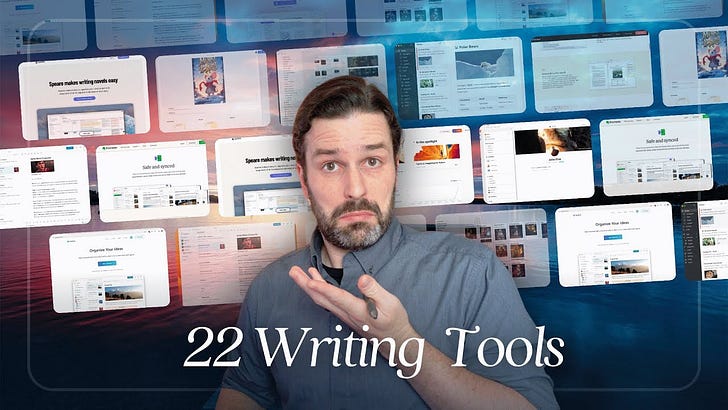




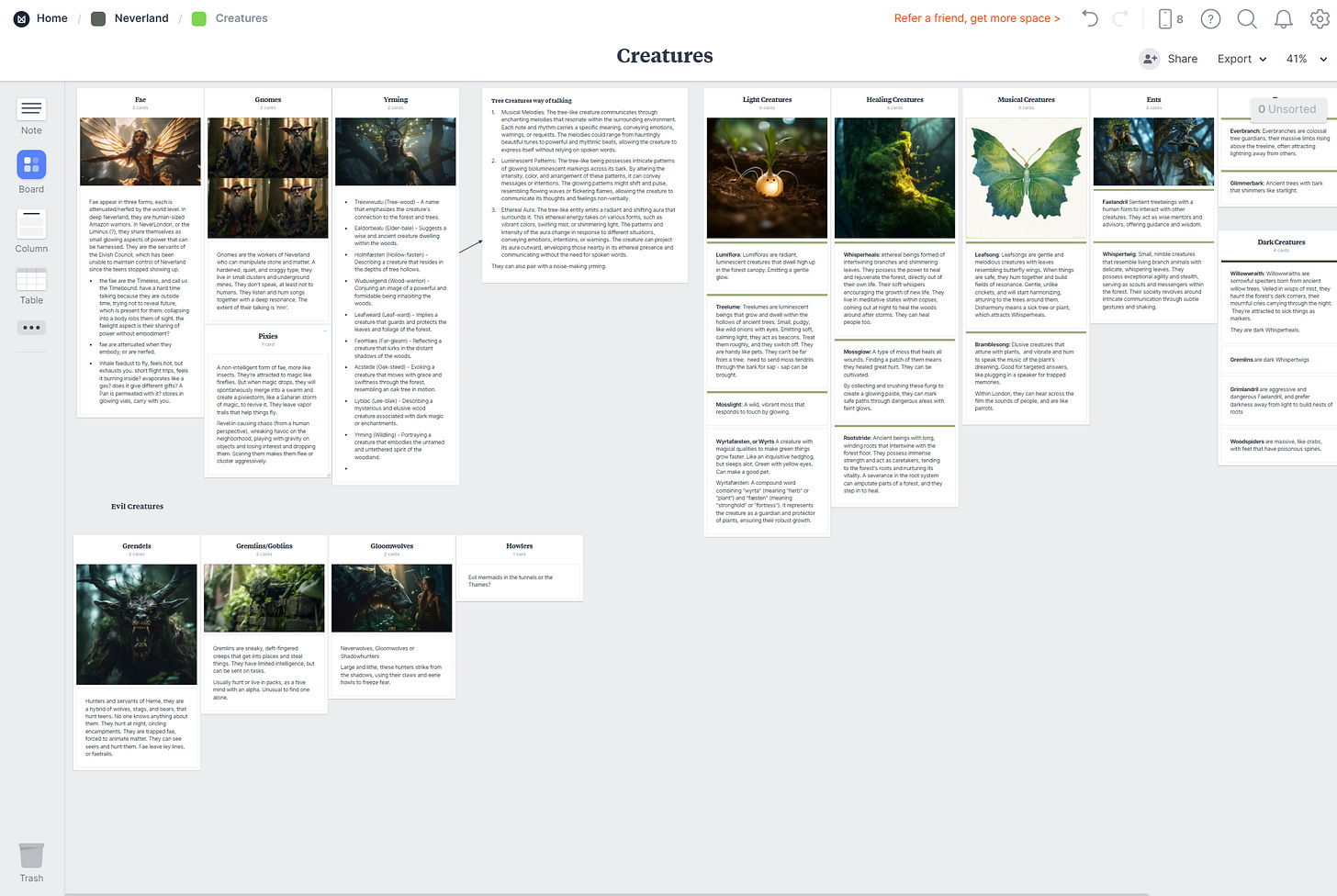









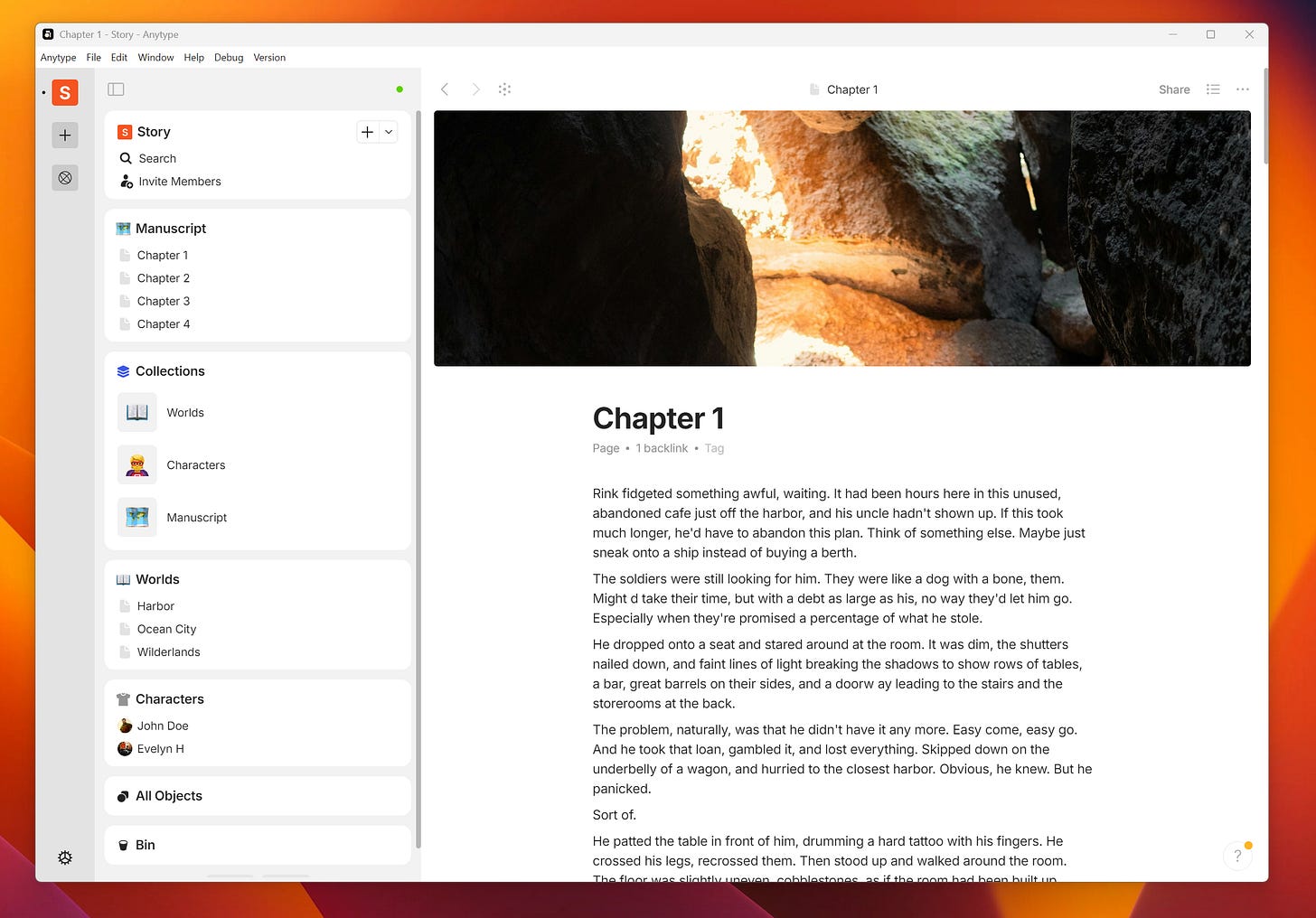





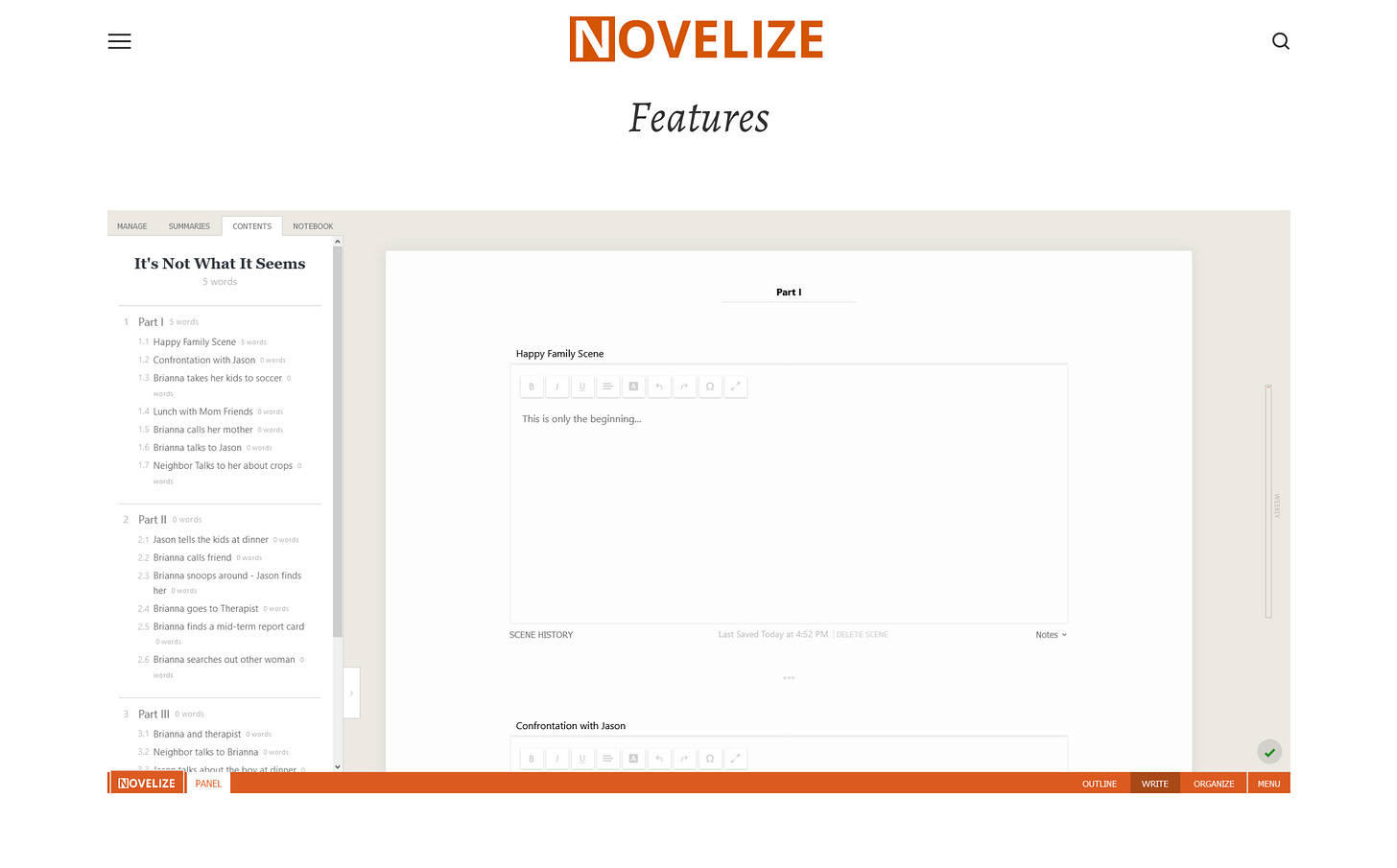







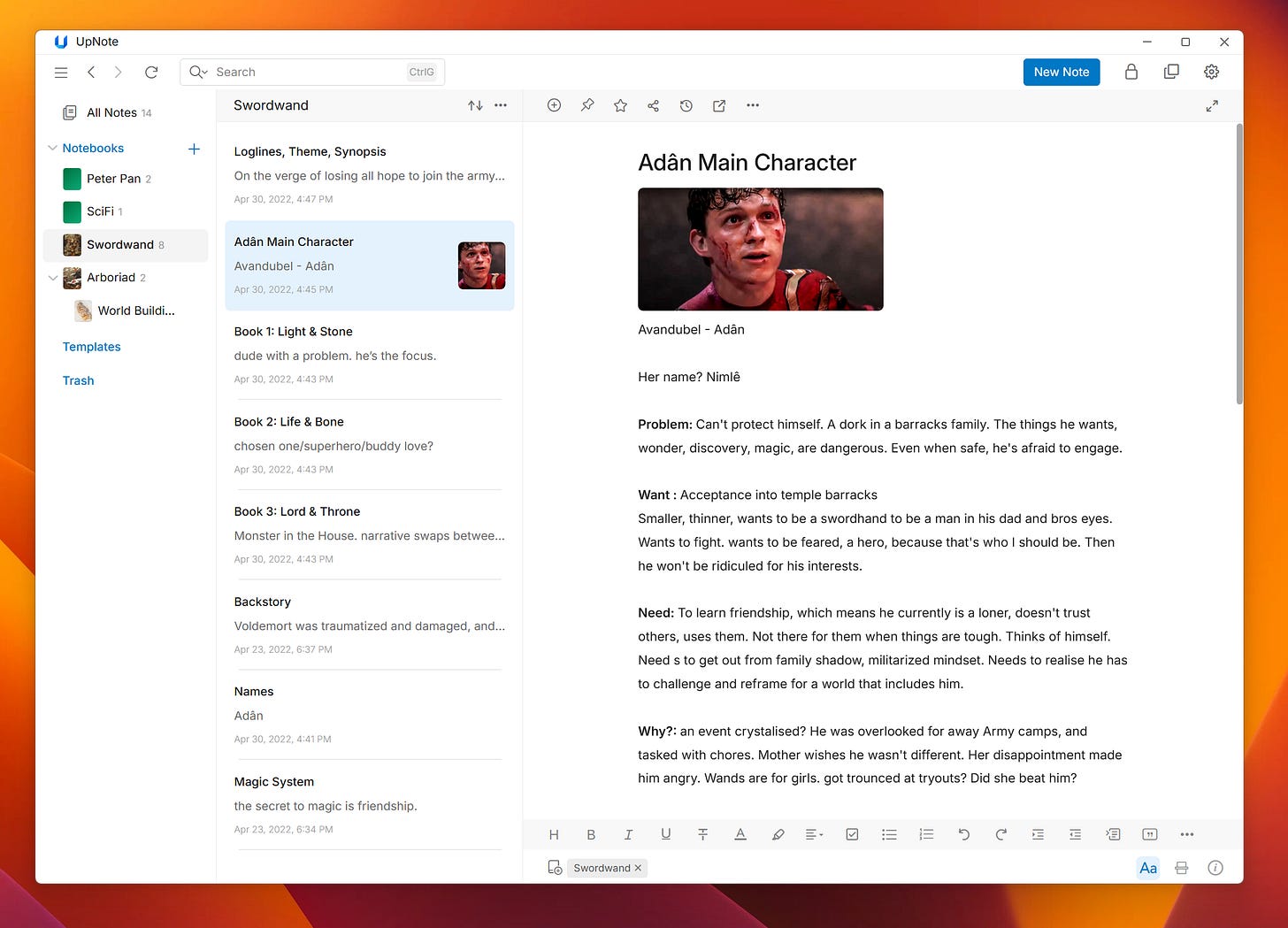

Which of these have you never heard of before? What's your fave tool right now?
I was a big obsidian fan till I moved to mac and discovered Ulysses. I use ulysses now for drafting, it's clean and simple and does just enough to get words down in a distraction free way that syncs well between machines.
I just this last week setup an old ipad with keyboard case to ONLY run Ulysses, it's locked down to that single app. Turn it on ulysses is there, can't even get to the home screen :) But wifi is on and it syncs to my desktop.
I convert drafts from there into scrivener which I much prefer for editing and revising with some of the powerful features it has for those tasks. It's much more analytical and clinical, just what I don't need when I'm trying to get a first draft done.
Interesting mix that seems to work for me.
For now. ;)